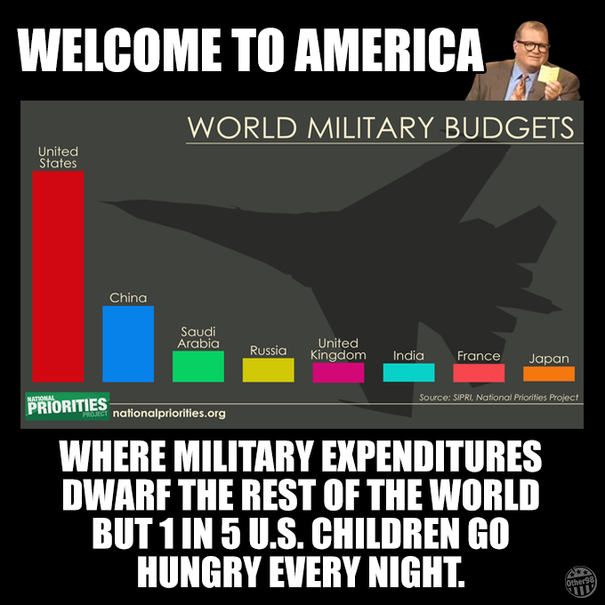
Nobel Laureates Call for
2% Cut to Military Spending Worldwide
Dan Sabbagh / The Guardian
(December 14, 2021) — More than 50 Nobel laureates have signed an open letter calling for all countries to cut their military spending by 2% a year for the next five years, and put half the saved money in a UN fund to combat pandemics, the climate crisis, and extreme poverty.
Coordinated by the Italian physicist Carlo Rovelli, the letter is supported by a large group of scientists and mathematicians including Sir Roger Penrose, and is published at a time when rising global tensions have led to a steady increase in arms budgets.
“Individual governments are under pressure to increase military spending because others do so,” the signatories say in support of the newly launched Peace Dividend campaign. “The feedback mechanism sustains a spiralling arms race — a colossal waste of resources that could be used far more wisely.”
The high-profile group says the plan amounts to a “simple, concrete proposal for humankind”, although there is no realistic prospect that military spending cuts will be enacted by large or medium-sized governments, or that any sums saved would be handed over to the UN and its agencies.
Total military spending amounted to $1,981 billion (£1,496 billion) last year, an increase of 2.6% according to the Stockholm International Peace Research Institute. The five biggest spenders were the US ($778 billion), China ($252 billion), India ($72.9 billion), Russia ($61.7 billion) and the UK ($59.2 billion) — all of whom increased their budgets in 2020.
Growing tensions between Russia and the west over situations such as Ukraine and between China and the US and its Pacific allies over Taiwan have helped contribute to rising spending, while in recent years some non-proliferation treaties such as the INF agreement, which kept nuclear missiles out of Europe, have been allowed to lapse.
The letter’s signatories argue that arms races can lead to “deadly and destructive conflicts” and add: “We have a simple proposal for humankind: the governments of all UN member-states negotiate a joint reduction of their military expenditure by 2% every year for five years.”
Other supporters of the letter include the Tibetan spiritual leader the Dalai Llama, who is a past winner of the Nobel peace prize, as well as the biologist and Cambridge University professor Sir Venki Ramakrishnan and the American molecular biologist Carol Greider.
They call on the world’s political leaders to allow “half of the resources freed up by this agreement” to be allocated to “a global fund, under UN supervision, to address humanity’s grave common problems: pandemics, climate change, and extreme poverty”. Such a fund, they claim, could amount to $1 trillion by 2030.
Posted in accordance with Title 17, Section 107, US Code, for noncommercial, educational purposes.
Pentagon to Cut Stateside Cost-of-living
Stipend for Thousands of Troops in 2022

(December 26, 2021) — The Department of Defense (DoD) announced last week that troops in 15 metropolitan areas and 21 non-metropolitan counties in the continental United States will be cut off from a cost-of-living allowance starting Jan. 1.
The change will lead to approximately 48,000 troops missing out on the Continental United States Cost-of-Living Allowance (CONUS COLA), according to Stars and Stripes.
Approximately 6,000 service members will remain recipients of the $8.5 million that the Pentagon allocated for the stipend, which is given to troops who are stationed at excessively expensive locations in the lower 48.
The 2022 list comprises 20 non-metropolitan counties and six metropolitan areas, which include New York City, Long Island, and Staten Island in New York; Nantucket, Mass.; Boulder, Colo.; and San Francisco, Calif.
The COLA rate is based on information gathered by a contractor, which analyzes cost of transportation, goods and services, federal income taxes, sales taxes, and miscellaneous expenses, according to the DoD.
A location becomes eligible for COLA when non-housing costs exceed 8% above the national average.
Among the locations that were cut in 2022 is the Washington, D.C., area, where troops had received a 1% supplement in 2021. Stipends for troops in Boston and Worcester, Mass., also got the ax.
Troops located in New York City will receive the highest stipend at 6%, which is down from 7% in 2021.
How much COLA a service member earns depends on geographic duty location, pay grade, years of service, and dependency status. The Pentagon explained that monthly payments for each CONUS COLA percentage point vary from $33 to $59 per month for troops with dependents, and from $22 to $45 per month for those without dependents.
Posted in accordance with Title 17, Section 107, US Code, for noncommercial, educational purposes.